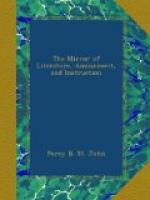more heavy judgments, which militates against their
reformation: instead of reflecting on their situation
as brought on by themselves, they take refuge in complaint
and invective, declaring they are “sacrificed”—in
their own language, “murdered men.”
I have often said, “Why complain? You knew
the consequence of detection.” “Yes,”
would be the reply; “but look at the case of
Tom —— and Bill ——.
Not that I am sorry they have got off; but is it not
a shame to give me a
lifer, and they only a
month each?” Such answers are always given when
any attempt is made to reconcile them to their fate.
They carry this feeling with them to the hulks, where
they amuse each other with all the tales of hardship
within their knowledge; meditating revenge, by which
they mean becoming more desperate in crime, and making
reprisals on the public, when they shall be again at
large. They become imbued with a notion the judge
has more to answer for than themselves. Opinions
of this nature are very common among them, and prevent
the discipline to which they are submitted having its
proper effect. Minds in the state of theirs seize
on any supposed injury to brood over and stifle their
own reproaches. Of this
dernier ressort
they would be deprived, if equal sentences were passed
on all for like offences. They are now all ill-used
men, by comparison with others who have been more
fortunate. The present system holds out so many
chances for the offender to escape, that it acts as
an inducement to continue his practices, and to all
loose characters, not yet accomplished in the art
of plunder, to become so. Again, by the discharge
of so many known thieves every sessions, so many masters
are sent into the town to draw in and teach others,
by which a regular supply is brought up to fill the
ranks of those who fall in the conflict.
* * * *
*
THE SELECTOR; AND LITERARY NOTICES OF NEW WORKS.
* * * *
*
SCRIPTURAL ANTIQUITIES.
A little volume has just appeared, with the title
of The Truth of Revelation demonstrated by an appeal
to existing monuments, sculptures, gems, coins, and
medals. The author is stated to be “a
Fellow of several learned Societies,” and has
dedicated his work to Dr. Chalmers, who approved of
its original plan. We confess this to be too extensive
for us to explain in a few lines, although we do not
hesitate to say, that a more amusing book upon abstruse
subjects has scarcely ever met our attention.
It is literally filled with facts and closely-packed
inquiries, and these are so attractively arranged as
to amuse a listless reader.
The Ark of Noah and Mount Ararat.




